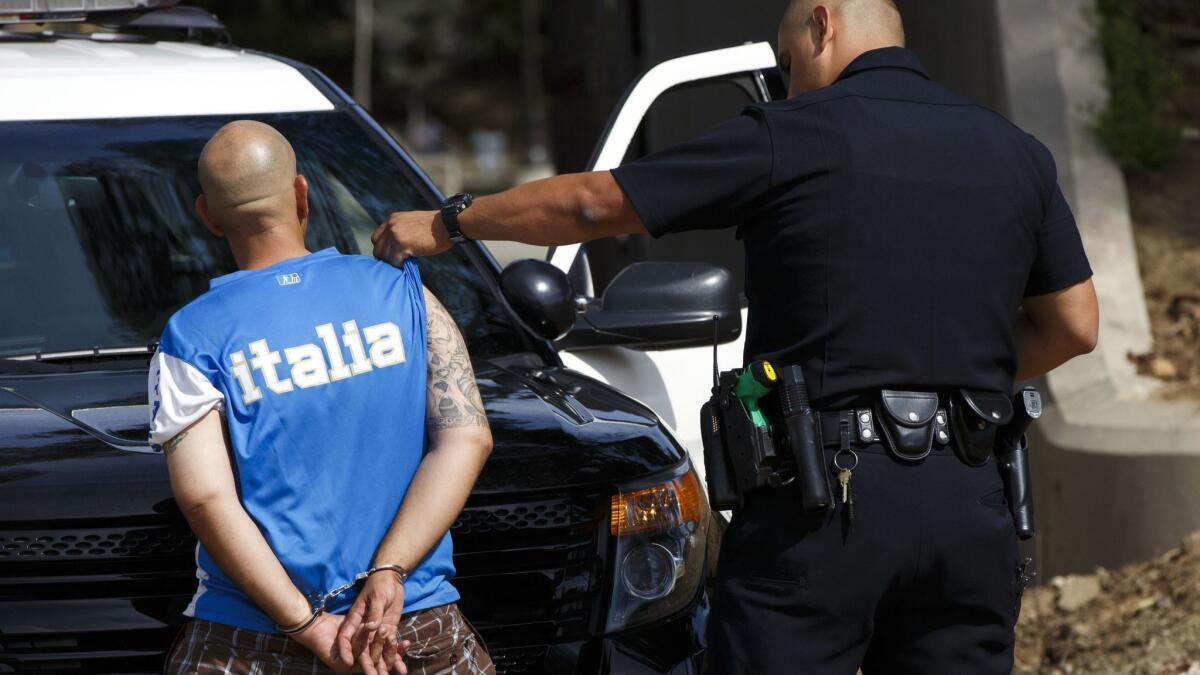Does the LAPD still need gang injunctions to fight crime? The city is about to find out

- Share via
For decades, police in Los Angeles have considered gang injunctions an invaluable tool that helped reduce violent crime in a region that once gained infamy as the birthing ground of some of the country’s most notorious gangs.
The city at one point had injunctions against nearly 8,900 people in the city, but that number had been reduced to just 1,450 by the end of last year amid growing criticism that the injunctions — which can severely restrict the movements, even the clothing, of suspected gang members — are overly broad and often unfairly target black and Latino men.
This week, a federal judge barred the city from enforcing almost all of its remaining injunctions. But it remains an open question whether the move will have much of an effect on policing at a time when gang violence is waning and law enforcement officials are turning to different methods to combat the gangs that remain.
The names and criminal histories of the 1,450 people who were still subject to gang injunctions have not been made public, but the Los Angeles city attorney’s office described them as people whom the city could prove their gang activity beyond a reasonable doubt. Some officers described them in much harsher terms.
“These are active gang members who are, for lack of a better term, boots on the ground for their respective gangs,” said one veteran LAPD gang investigator, who spoke on the condition of anonymity because the source was not authorized to speak with the media.
Neither the city attorney’s office nor the LAPD has commented on a possible appeal, though the union that represents rank-and-file officers urged the city to fight back and called the ruling “shortsighted” on Thursday.
Police Chief Charlie Beck told The Times on Friday that he believes injunctions are still an effective tool and the city will try to maintain their use, through an appeal or policy change.
Thursday’s court order does not bar the LAPD from seeking injunctions, nor does it invalidate the injunctions themselves. The decision stemmed from a 2016 lawsuit by the American Civil Liberties Union of Southern California that challenged the way the city obtains injunctions, alleging the process was unconstitutional.
Authorities normally seek an injunction against a gang, rather than an individual, meaning someone can become subject to one of the court orders without being given a chance to disprove his or her alleged gang affiliation in court.
Decisions about whom to serve with an injunction are made independently by LAPD investigators and prosecutors. The injunctions are enforceable only in specific areas that the city has deemed to be gang territory, termed “safety zones.” People subject to injunctions can be barred from wearing certain types of clothing in specific neighborhoods, and even ordered not to congregate with family members who are also subject to an injunction. Violating the orders can result in arrest.
Earl Paysinger, a former assistant police chief who now serves as the vice president of civic engagement at USC, suggested the injunctions are not as crucial to the department’s crime-fighting plans as they once were.
Paysinger, who oversaw a massive reduction in homicides in the once gang-ridden South Bureau, said the court orders were borne from a time when gang slayings would lead to rapid retaliation killings, driving annual gang homicide totals in the hundreds.
“I think the gang injunctions, at the time, were a necessary, important dimension of our work in law enforcement. Gang culture was so enticing,” he said. “Today we have gang crime at nowhere near the level we once did. Gang size, gang rivalries and gang wars are nothing like those in the past.”
Paysinger does not believe a reduction of gang injunctions will immediately cause the city’s gang scene to resurge, but he did caution that police leaders should monitor the situation closely.
A veteran LAPD captain, who also spoke on the condition of anonymity, said the injunctions are far less relevant to the city’s policing strategy than they were in the 1990s.
“The gang injunctions came into play when we had 1,100 murders in the city and 60% of those involved gangs. Last year, we had about 280 murders and 60% were gang-related,” the captain said. “The percentage of gang homicides has remained the same, but the level of violent crime has fallen dramatically.”
Other officers were more concerned about Thursday’s court order. Although the city has dramatically scaled back its use of the injunctions, releasing 7,300 people from the injunction rolls last year after a citywide audit, a veteran LAPD gang investigator who has helped obtain injunctions said most of the people who were not cleared during the 2017 audit had either been convicted of, or arrested on suspicion of , gang crimes in the past.
The investigator also said the department is not seeking new injunctions against rising young gang members until the ACLU lawsuit is hashed out. The investigator also questioned whether the courts had considered the effect that scaling back the injunctions could have on people who live in neighborhoods with a heavy gang presence.
“Put yourselves in the shoes of a low-income family who can’t move out of this apartment complex but they’ve got 10, 15, 20 gang members congregating in their parking lot, sitting on their cars. These people are living in absolute fear,” the investigator said. Injunctions “allow the officers to improve the daily quality of life of these low-income families who are trapped in these apartments where the gang members are running rampant.”
Follow @LACrimes and @JamesQueallyLAT for crime and police news in California.
More to Read
Sign up for Essential California
The most important California stories and recommendations in your inbox every morning.
You may occasionally receive promotional content from the Los Angeles Times.














